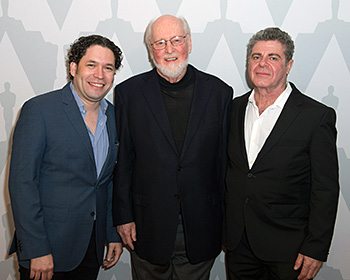

  |
|
|
||||||||||||||||||||||
|
FMS FEATURE... July 23, 2014 Williams, Santaolalla and Dudamel Go Behind the Score LACMA teams with Academy in the art of film music by Jon Burlingame  (Left to right) Gustavo Dudamel, John Williams and Gustavo Santaolalla Williams, the five-time Oscar winner (for such classics as Jaws and Star Wars), was very much the elder statesman (or "legend," as host Tavis Smiley put it). Both Santaolalla (dual Oscar winner for Brokeback Mountain and Babel) and Dudamel, the Los Angeles Philharmonic conductor who has just written his first score for a Venezuelan film, Libertador, consistently deferred to him. Dudamel and Santaolalla will appear at the Hollywood Bowl July 31 to play their film compositions. Smiley started the conversation by asking his guests if they preferred to start each assignment by reading a script, or by seeing the film itself. Williams said he would rather watch the film and get "a virgin reaction," while Santaolalla said he preferred to read the script and discuss it with the director first. Each composer was asked, in advance, to choose three films with scores (by other composers) that they admired in three areas: music that set a tone, that built suspense, and that evoked emotional responses. Williams chose Chinatown (music by Jerry Goldsmith), Vertigo (Bernard Herrmann) and Braveheart (James Horner). Santaolalla chose Paris, Texas (Ry Cooder), Jaws (Williams) and Elevator to the Gallows (Miles Davis). Dudamel chose Melancholia (which used Wagner's Tristan and Isolde), The Mission (Ennio Morricone) and American Beauty (Thomas Newman). Williams liked the Chinatown opening because "it's so atmospheric... it takes us to where the film is going to be in time [and] creates a melodic identification for the film and the characters." He said he "loves" to conduct Herrmann's "Scene d'Amour" from Vertigo, which he called "insistent" and "uniquely powerful in its expression." He was less specific about the Horner clip, but cited the "tremendous universality" of music to communicate to audiences around the world. Santaolalla revealed that Cooder's slide-guitar opening for Paris, Texas is actually a cover of an old Blind Willie Johnson tune, but one that "sets the tone... a lonely, lost soul, that grabs your attention and leaves you expecting more." He compared Williams' Jaws theme with Herrmann's Psycho; Williams explained that he was attempting to musically depict "an unstoppable force" and "ignite primordial fear" in audiences. In the case of the Miles Davis jazz score for the Louis Malle film, "it somehow evokes the displacement of the characters," he said. Dudamel compared the use of Wagner in Melancholia to the Vertigo sequence, as "never-ending... where it is taking us?" He praised Morricone's use of the oboe in The Mission as "a powerful melody, such a simple thing," and lauded Newman's use of percussion in American Beauty as "minimalistic... very simple, like a clock, time counting" as the lead character's time is running out. Dudamel recounted his recent experience scoring his first film. Libertador, the story of 19th-century general Simon Bolivar and his struggles to liberate South America from Spanish rule, is now playing film festivals; Dudamel will debut his 20-minute suite next week during a Hollywood Bowl appearance with the Los Angeles Philharmonic. He said he consulted with Williams at the start of the process and found the advice – especially Williams' suggestion to simplify the approach – invaluable. Smiley asked about the impact of shrinking budgets and the role of technology in film scoring. Williams responded by noting that "aesthetically," a film might need one musician or the entire L.A. Philharmonic. "Budgets are what they are [and] we work with the tools that we have." But he pointed out that, regardless of all the new music-making machines of the past 50 years, "there isn't an instrument yet invented that, in its expressiveness, is quite like an orchestra." Williams said much of his work was "intuitive," suggesting that his experience (now 56 years of writing music for films and TV) offers a strong indication of what music will best solve any dramatic problem. When Smiley asked if he ever felt guilty about his endless manipulation of people's feelings over more than 100 films, Williams responded that maybe "manipulation was not a well-chosen word," to audience laughter. "Music is the emotional connection between the film the audience," added Santaolalla, who said he wanted "to affect people in a positive way with my work." Art, he said, "is a way of reorganizing reality." Asked by Smiley to cite a personal moment that had impacted his career, Williams surprised the audience with a memory of the early 1970s: "I lost someone very close to me, unexpectedly," an apparent reference to his wife Barbara's death in 1974. "It was a huge emotional turning point in my life." Yet, he said, "after that, I felt clear about what I was trying to do... It taught me about who I was. It was a pivotal moment," he said. ©2014 Jon Burlingame |
Search
Past Features
|